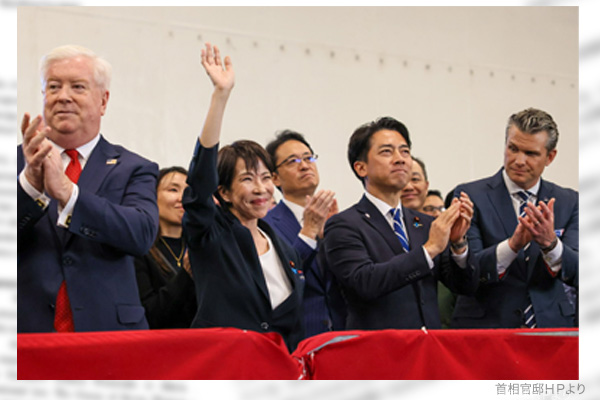The establishment of a coalition government between the Liberal Democratic Party and the Japan Innovation Party provides a historic opportunity to restore Japan under conservative philosophy, raising expectations for a reformist conservative government capable of implementing policies that step into the very foundations of the nation.
Commendable constitutional and national security policies
What deserves particular attention is the coalition agreement signed on October 20. It clearly states that the two parties “share a vision for the nation, create a stable government by overcoming differences, break through national crisis, and strive for Japan’s revival.” In particular, it is important that the two parties share realist visions for international politics and national security rooted in a clear understanding of how to protect the Japanese people and Japan’s peace and independence.
Specifically, the agreement clearly states that the two parties will launch a council to draft an amendment to Article 9 of the constitution during this year's extraordinary Diet session. Their commitment to reshaping the nation into what it ought to be—a task long neglected by postwar politics—is highly commendable.
As for national security policy, they also set forth plans to update three strategic documents including the National Security Strategy ahead of schedule, while further strengthening defense industry and technology base. Particularly, their planned measures to be taken during an ordinary Diet session next year are expected to resolve long-standing national security problems. These measures include: to abolish the current rule of limiting defense equipment exports to five categories—rescue, transport, warning, surveillance, and minesweeping—under the operational guidelines for the three principles of defense equipment transfer; to establish state-run munitions factories; and to promote the government’s ownership of facilities operated by the private sector to ensure the stable supply of critical materials.
The agreement also signals a willingness to consider fundamental reforms to the Self-Defense Forces, including the creation of a special pension system, in response to the critical issue of recruitment shortages. Given that these measures were difficult to pursue under the previous LDP-Komeito coalition, the launch of the LDP-JIP coalition may well mark the dawn of Japan’s national security policy.
Inevitable revision of the three non-nuclear principles
However, some issues remain unaddressed. Given rapidly increasing threats from the three nuclear powers of China, Russia, and North Korea, Japan cannot avoid discussions on how to strengthen its nuclear deterrence. China has doubled the number of nuclear warheads from 260 to 500 in the past three years, while Russia has continued nuclear intimidation through the Ukraine war. North Korea possesses 50 nuclear warheads and is diversifying the means of their delivery. Under the circumstances, ensuring effective deterrence to prevent another nuclear attack on Japan lies at the heart of a realist national security policy.
For example, the United States is developing nuclear Tomahawk cruise missiles for submarines and surface ships under the Trump administration, with operational deployment expected in the 2030s. The port call of such vessels in Japan is essential for nuclear deterrence. Therefore, Japan should at least reconsider the “no introduction” clause of its Three Non-Nuclear Principles—not to possess, produce, or permit the introduction of nuclear weapons—and move toward a framework of Two Non-Nuclear Principles. Japan should confront the reality of the nuclear arms race and initiate policy discussions promptly to ensure the protection of the Japanese people from nuclear threats.
Only when the abovementioned measures are steadily implemented, the LDP-JIP coalition may be considered as a reformist conservative government.
Kiyofumi Iwata is a member of the Planning Committee at the Japan Institute for National Fundamentals. Formerly, he served as Chief of Staff of the Japan Ground Self-Defense Force.


